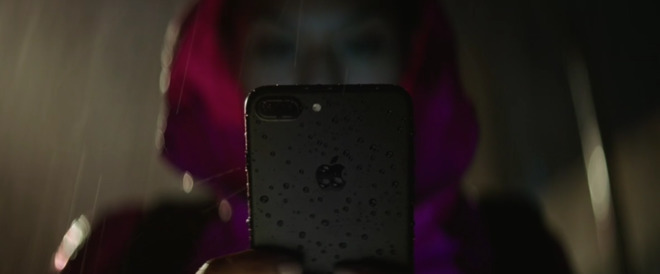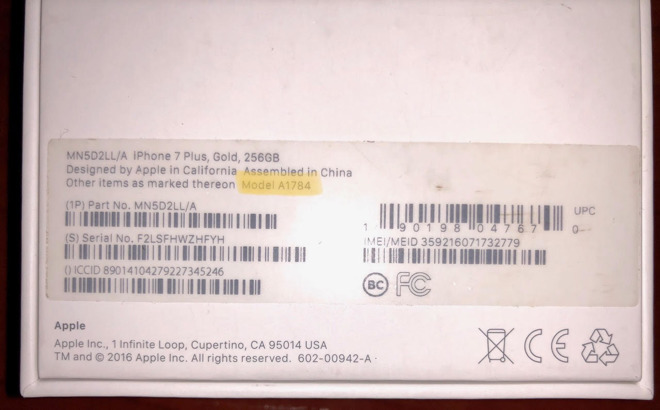iPhone 7 Plus Intel or Qualcomm modems at crux of small claims court victory over Apple
Mark Hanusz paid over $1,000 for an unlocked iPhone that would work with "any carrier" in 2016, only to find it didn't work with Verizon in 2018 -- and sued Apple over it.

When author and publisher Mark Hanusz returned to the United States in 2016 from 25 years living abroad, he went to an Apple Store in Toledo, Ohio and purchased an unlocked iPhone 7 Plus, which he was told would work on "any carrier." He intended at first to use T-Mobile, but needed access to other carriers in order to use the device on his extensive international travel schedule.
But over a year later, when Hanusz tried to use his iPhone on the Verizon network, it didn't work, and on a return trip to the Apple Store he was told in person that it wouldn't. When he asked whether he could return the device in exchange for one that would work on Verizon, he was told it was too late to do so, and he should have returned the device within Apple's 14-day window.

Hanusz's iPhone 7 Plus, model A1784 for AT&T and T-Mobile
That set off a saga in which Hanusz was ejected from the Apple Store after complaining about the situation, received little help when he called the company, and then sued Apple in Ohio small claims court.
"Apple's next mistake was to send the store manager and not an attorney to the court -- which they were required to do," said Hanusz in an email to AppleInsider. "This visibly upset the magistrate (it implied Apple couldn't be bothered to take this seriously) and therefore Apple couldn't present a defense, nor cross examine me."
Hanusz emerged victorious. Ohio Magistrate Catherine G. Hoolahan wrote in her decision that "Defendant's sale of the locked' iPhone to Plaintiff for the price of an unlocked' iPhone constitutes a deceptive act.'"
Different versions of the iPhone 7 and iPhone 7 Plus use different modems. Models intended for T-Mobile and AT&T customers use Intel models, with Verizon and Sprint customers getting Qualcomm modems.
The iPhone models with the Qualcomm modem works with GSM+CDMA and does work with all carriers. The Intel modem in the iPhone sold to Hanusz only supports GSM, and is incompatible with Verizon's network regardless of it being unlocked or not.
The magistrate is not completely accurate when it comes to the legal definition of "unlocked" as it relates to the carriers. To meet the FCC requirements, a phone just needs to be not bound to one carrier to qualify as unlocked. There is no requirement for an unlocked device to work on all carriers, and hardware limitations like a frequency not being supported by a cellular modem, are allowed.
So, by the definition of unlocked, Hanusz's A1784 iPhone 7 Plus qualifies as unlocked, as it will work on AT&T or T-Mobile's networks -- but not Verizon, as Hanusz needed, and was promised by the Apple Store employee.
Apple has not yet responded to AppleInsider's request for comment, regarding why Hanusz wasn't sold the Qualcomm-equipped iPhone 7 Plus at the time.

When author and publisher Mark Hanusz returned to the United States in 2016 from 25 years living abroad, he went to an Apple Store in Toledo, Ohio and purchased an unlocked iPhone 7 Plus, which he was told would work on "any carrier." He intended at first to use T-Mobile, but needed access to other carriers in order to use the device on his extensive international travel schedule.
But over a year later, when Hanusz tried to use his iPhone on the Verizon network, it didn't work, and on a return trip to the Apple Store he was told in person that it wouldn't. When he asked whether he could return the device in exchange for one that would work on Verizon, he was told it was too late to do so, and he should have returned the device within Apple's 14-day window.

Hanusz's iPhone 7 Plus, model A1784 for AT&T and T-Mobile
That set off a saga in which Hanusz was ejected from the Apple Store after complaining about the situation, received little help when he called the company, and then sued Apple in Ohio small claims court.
"Apple's next mistake was to send the store manager and not an attorney to the court -- which they were required to do," said Hanusz in an email to AppleInsider. "This visibly upset the magistrate (it implied Apple couldn't be bothered to take this seriously) and therefore Apple couldn't present a defense, nor cross examine me."
Hanusz emerged victorious. Ohio Magistrate Catherine G. Hoolahan wrote in her decision that "Defendant's sale of the locked' iPhone to Plaintiff for the price of an unlocked' iPhone constitutes a deceptive act.'"
Different versions of the iPhone 7 and iPhone 7 Plus use different modems. Models intended for T-Mobile and AT&T customers use Intel models, with Verizon and Sprint customers getting Qualcomm modems.
The iPhone models with the Qualcomm modem works with GSM+CDMA and does work with all carriers. The Intel modem in the iPhone sold to Hanusz only supports GSM, and is incompatible with Verizon's network regardless of it being unlocked or not.
The magistrate is not completely accurate when it comes to the legal definition of "unlocked" as it relates to the carriers. To meet the FCC requirements, a phone just needs to be not bound to one carrier to qualify as unlocked. There is no requirement for an unlocked device to work on all carriers, and hardware limitations like a frequency not being supported by a cellular modem, are allowed.
So, by the definition of unlocked, Hanusz's A1784 iPhone 7 Plus qualifies as unlocked, as it will work on AT&T or T-Mobile's networks -- but not Verizon, as Hanusz needed, and was promised by the Apple Store employee.
Apple has not yet responded to AppleInsider's request for comment, regarding why Hanusz wasn't sold the Qualcomm-equipped iPhone 7 Plus at the time.
06 Apple Verdict by Mike Wuerthele on Scribd

Comments
I'm glad he won, good for him!
"What exactly did he ask for and what exactly was he told when he bought the phone?"
This term "unlocked" has had multiple meanings throughout the years and created grey, muddy waters for most people. And, for most in the general public, they don't even realize the waters are muddy. They don't even know that there is a question to be asked.
Back in the day, a carrier would "lock" a device to their network until you had paid off its 2 year contract. Essentially, the phone and the carrier were inseparable. Later, as people started keeping phones longer, carriers were required to remove that lock (aka "Unlock") the phone after it was paid off.
Meanwhile, nobody explained to GENERAL PUBLIC that certain modems would only operate on certain networks and certain bands. It took me 2 months to get that point across to a friend of mine.
... But, there was still a difference between "unlocked" and able to operate on "any" domestic carrier.
.........In fact, there isn't even a term to describe a phone as able to operate on any carrier!
Apple has defaulted now to calling those phones "SIM free" -- which technically means it doesn't come to the Apple Store with a SIM card in it!
I think that Apple could have done better to explain these technicalities to there customers and helped to avoid confusion and misunderstanding. I suspect that this lawsuit relates back to that. The customer thought he was buying a phone that would operate on any carrier while the more tech savvy Apple Store employee simply sold him an "unlocked" phone without clarifying that it was restricted to only certain carriers.
I suspect that Apple may have contested the case because someone in the company asked themselves how much it would cost the company if thousands of ATT or T-Mobile customers suddenly came forward saying that they wanted to switch to Verizon.
That said, Apple's online iPhone specs for each model clearly say that: "Models A(xxx) and A(zzz) do not support CDMA networks, such as those used by Verizon and Sprint." On the one hand consumers have some duty to educate themselves reasonably about their purchase, but on the other this guy did that by asking in the store. It's also possible that by "any carrier" the store thought it was answering his question only about overseas use, which was his main concern, in which case "any carrier" was essentially the correct answer. (There have only ever been a very few CDMA carriers in the rest of the world.)
It would have cost Apple almost nothing to just give him a new phone. My wife took an insurance company to small claims court over a $1500 damage claim after an automobile accident. They refused to pay and brushed her off like so much dirt under their fingernails. The judge ruled in my wife’s favor so the insurance company not only had to pay the claim but court costs and their lawyer’s fees. My wife represented herself. Then the bastards drug their feet in sending the check so my wife called the court and the clerk threatened them with legal action. The check came a few days later.
However last year when I went to upgrade to the iPhone X the local Apple store manager advised they had no discretion to provide me a "world phone" and that because I had AT&T as my carrier I had to upgrade (which would be really a downgrade) to Intel chipset. The advice Apple (both at the store and when I phone Apple) provided was that the carriers tied their hands and that no exceptions could be made. However when I phoned both AT&T and Verizon they advised that this decision was solely Apple's as it was Apple who had arranged the financing program. Net was that I couldn't/didn't upgrade my iPhone 7 last year and will be forced to run the two year lease out. Note that once "unlocked" iPhone X was available I was told I could upgrade at that time (but I've since been told that may not be the case).
I feel that Apple is ripe for class action lawsuits here as they clearly advertised "world phone" when I signed up for the program. Apple minimizes information on the differences between the various phone versions they now sell. Intel and Qualcomm chipsets are vastly different (I'm a geologist and I need the very best GPS which is only available in the Qualcomm chipset). If a class action is filed the press it would generate on this issue could well damage Apple's case against Qualcomm.
The weird thing on all of this is that Apple's decision to not allow me to upgrade (or the gentleman in the article to purchase the phone he needs) serves no purpose for Apple or its carriers. I have one of the participating carriers (AT&T), which I'm upset with over this issue and may now switch to over to Verizon to get a "world phone" and Apple doesn't make an iPhone X sale to me. Furthermore I won't ever use their two year upgrade program going forward. Everyone loses here. It's stupid
It doesn’t really matter though, Apple should make sure the employees explain clearly what a customer is getting. They should have also just swapped the phone even if they felt they were right.
It could be the buyer was a jerk and no communication between himself and Apple could have ensued. Well, in that case, they both messed up.